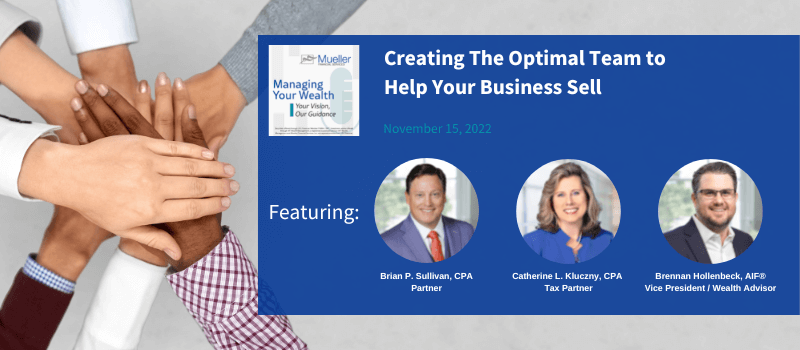
Podcast: Creating The Optimal Team To Help Your Business Sell
By Mueller Financial Services, December 5, 2022
Join Vice President / Wealth Advisor Brennan Hollenbeck, along with PKF Mueller Partners, Brian Sullivan and Cathy Kluczny, as they discuss creating the optimal team when looking to sell your business. In this episode, they describe what the optimal team looks like, the tax implications to focus on, and the importance of a financial plan.
Listen Now:
For more information, please contact:

Brennan Hollenbeck, AIF®
Vice President / Wealth Advisor
bhollenbeck@muellersolutions.com

Brian P. Sullivan, CPA
Audit Partner
bsullivan@pkfmueller.com

Catherine L. Kluczny, CPA
Tax Partner
ckluzny@pkfmueller.com
Episode Transcript:
[00:00:00] Ashley: Hi, I’m Ashley, and you’re listening to “Managing Your Wealth: Your Vision, our Guidance.” Today we welcome Mueller Financial Services Professional Brennan Hollenbeck, and two PKF Mueller Partners Brian Sullivan and Cathy Kluczny, to discuss what the optimal team looks like when you are interested in selling your business. But before we begin, let’s do a quick introduction of our guests.
[00:00:30] Ashley: Brennan is an Accredited Investment Fiduciary and Wealth Advisor who has over 10 years of experience providing Wealth planning and financial advisory services to high-net-worth individuals, multi-generational families, executives, entrepreneurs, and their closely held businesses.
[00:00:44] Ashley: With over 30 years of experience, Brian leads the PKF Mueller Audit Department focusing on audit, assurance, and mergers and acquisitions; including due diligence engagements, quality of earnings reportings, internal control analysis, accounting, tax planning, and business management strategic planning for U.S. and international clients.
[00:01:00] Ashley: Cathy is a Partner at the PKF Mueller Tax Department. She has over 28 years of experience providing tax accounting and business consulting services. Her service focus includes tax planning, tax structuring, mergers and acquisitions, tax due diligence, tax compliance, and middle market companies, and pass through entities and their Owner’s.
[00:01:18] Ashley: First off, I just wanna thank you all for joining us today on the podcast, and then with that, let’s begin. If I were a business owner looking to sell my business, what would my first step look like? Or what does the optimal team look like?
[00:01:30] Brian: Yeah, that’s a great question, Ashley.
[00:01:31] Brian: You know, selling the your business is likely the biggest transaction of your life. Having the right team in place long before the event is critical to optimizing the outcome of the sale, the right CPA, financial advisor, attorney, and investment banker, working toward the same goal on your behalf is always the best approach.
[00:01:47] Brian: Initially, I would encourage you to meet with a CPA that has transaction advisory experience and also include your trusted financial advisor. Having transaction knowledge and knowing what you need on the other side of the deal is great information as you begin the journey.
[00:01:59] Brian: At PKF Mueller, we like to bring the financial advisor, the tax advisor, and the accounting advisor together as a complete team on behalf of the client. Um, you will have a complete team going into the deal long before the transaction actually is consummated.
[00:02:16] Ashley: And so Brian, can you also maybe touch on what are the players that PKF Mueller works with on the outside that are not necessarily in house?
[00:02:23] Brian: Yeah, that’s another good question. You’re going to go outside for your M&A attorney and, and your investment banker, and we can certainly refer you to those folks for the right fit, for the right transaction.
[00:02:34] Ashley: What are some things that a client might think about when putting that team together as far as, is it the deal size? Is it the type of business they’re in, or how do they know that they’re at the right firm? And does PKF Mueller help choose that for them?
[00:02:48] Brian: We absolutely do. When you’re dealing with picking out an attorney to help you in the transaction, you don’t want a real estate attorney. You don’t wanna litigator. You want somebody that understands mergers and acquisitions and transactions. Of that nature. Selecting the right law firm and the right attorneys to represent you in this transaction is critical to its success because it doesn’t matter whether it’s a large corporation buying a publicly traded corporation or just buying the local gas station around the corner, you’re going to have a lot of the same documents and a lot of the same issues that you’re gonna run into just a different scale. So we like to make sure that we have a really good fit for the law firm that’s working with you on this transaction.
[00:03:26] Ashley: From a financial reporting perspective, what things does PKF Mueller do before and during the sale to help get a business ready?
[00:03:32] Brian: yeah. You know, we, it’s a funny thing. We used to have a seminar called Waxing the Car. Just like anytime you’re going to sell your car, you wanna make it look nice, you know you’re going to fix the little dents and the scratch. Maybe change the tires. You’re going to have it cleaned inside and out. We do the same thing with the company.
[00:03:48] Brian: We go in and we take a look at the company’s financial records. It’s internal control structure. We clean up the balance sheet, we clean up the income statement. We recast the financial statements to present, an economic picture of the business that’s easily understood for a potential purchaser. We review the tax returns, we’ll do a state nexus analysis and other related tax matters as well.
[00:04:09] Brian: We wax and polish the car and we manage the financial results of the business. We create a higher level of financial reporting, maybe a review or an audit so that someone coming in to do due diligence can take a look at those statements and really get a clear picture of the company.
[00:04:24] Brian: So then, you know, when it comes to little things like fixing the dents and painting the car, we advise a client on cleaning up the facility, perhaps, or fixing the equipment, maybe the production process and we add needed capital equipment capacity. Rebalance their debt, perhaps settle any contingent liabilities. Look at, look at the balance sheet and the income statement as a whole in relation to production.
[00:04:48] Brian: And then, you know, we’ll provide a warranty, growth projections, long-term profit plan in place, transition plan. A lot of purchasers are coming in and they need the operating entity to be able to operate. They’re not operators, they’re purchasers. And so that’s some of the things that we’ll take a look at as well.
[00:05:05] Ashley: So Brian, that sounds like there’s a lot that business owners need to do. What timeframe would you say is optimal if someone is considering selling their business, how long is it going to take to, you know, wax the car, paint the car, get the car ready to go?
[00:05:17] Brian: Well, we can work with within any timeframe. Way too often we’ll have clients come to us, you know, they’ve already signed an LOI or they’ve already got someone that’s coming to take a look at their company and, and that is way too late. We will do it and we’ll help as much as we can, provide as much service and insight that we can.
[00:05:35] Brian: Unfortunately we would much prefer to have a three to five year window at a minimum, because if you’re going to go from not having your financial statements audited to being audited, that generally is at least a two year process. And you might do a first year review or even a compilation and move up to an audit. And ideally, if a buyer is coming in, a large company perhaps to buy your company, they’re looking for three years of audits to review. And that, uh, also will take a long time sometimes to get the company in really good shape to be sold.
[00:06:05] Brian: Like you gotta find the right personnel, maybe improve the operations as we indicated before. So as much time as possible. I’ve had deals that have taken 10 years in the making and others that have gone off in six months, so, can be a wide range.
[00:06:20] Brian: Too many transactions die before they get to the table because the, a large company will come in, take a look at the company and realize that it’s not ready. And they back away and that is not a good answer. You wanna make sure that you have, you’re able to optimize not only the price, but the likelihood of the transaction.
[00:06:37] Cathy: Can I dovetail on that a little bit?
[00:06:38] Brian: Of course.
[00:06:39] Cathy: I also think that the timing and the work that’s done in advance helps with the whole due diligence process when the buyer comes in.
[00:06:49] Brian: A hundred percent.
[00:06:49] Cathy: And, um, the better shape you. , the faster the deal can close.
[00:06:54] Brian: Yeah, that’s absolutely true. We’ve had, um, after several years of audits and taken a look at how the company’s operating, to have a large firm diligence team come in and, and look at everything and go, Wow, okay, we’re, we’re good to go and close very, very quickly.
[00:07:10] Brian: Um, not that they’re still not gonna beach chop, but that’s what they get paid to do. Um, but it makes their job a lot easier and gives a lot of comfort to the potential.
[00:07:19] Ashley: Without getting too technical, what are some tax implications or tax planning aspects that business Owner’s should focus on during a potential sale?
[00:07:27] Cathy: You know, the tax implications of selling your business can be overwhelming. We work with our clients to help them understand the differences between an asset sale and a stock sale, and that looks different depending on the type of entity, the business is, whether it’s a C corporation, an S corporation, or a partnership.
[00:07:46] Cathy: In many cases, a buyer will want to purchase assets and the seller will want to sell stock. We can quantify the tax differences between an asset and a stock sale, and this helps our clients negotiate, the deal to get a fair selling price.
[00:08:03] Ashley: What are some strategies to help mitigate some of the personal tax liabilities?
[00:08:07] Cathy: We work with Mueller Financial Services to develop an investment strategy to help minimize tax.
[00:08:13] Cathy: Uh, in recent years, we’ve assisted clients in deferring the recognition of capital gains through qualified opportunity fund investments. We also can help minimize capital gains on the transaction by harvesting capital losses in the year of the sale.
[00:08:27] Brennan: Yeah, so on the financial services side, there’s obviously a lot of investment strategies that we can utilize to help minimize some of the tax implications from selling a business. Usually our team can do our best work after the transaction has been completed, but that absolutely doesn’t mean that we don’t wanna be part of the conversations ahead of time when discussing these tax implications, as Cathy mentioned, there can be years ahead of a potential sale where we can significantly harvest potential capital losses from sale of other personal investments, or take this year, for instance, where the stock market might be down. We can absolutely be proactively selling things, get those losses on the books, on the client’s balance sheet, and then potentially use those losses for a future year when that sale might happen. So there are things that we can do ahead of the sale, and there are things that financial services can do after a sale to help try to mitigate some of the tax.
[00:09:18] Brian: Yeah, that’s that’s an interesting point because if they don’t have a financial plan going into the sale, and I mean, a long time going into the sale proper, preferably, right?
[00:09:27] Brian: Not even probably, definitely preferably, um, they don’t know if they’re gonna be okay after the sale, even if that’s many, many millions of dollars, they won’t necessarily know. Right? And so not only is Cathy and the tax team working with the diligence team to ensure that we maximize the amount of funds coming out of the transaction, then we’re gonna maximize it to meet the plan that you’ve already established within years in advance. And that has been an extremely successful program for a lot of our clients.
[00:09:57] Ashley: Brennan, what are some resources you and your team have to assist business owners when they’re thinking about selling or are currently in the process of selling?
[00:10:04] Brennan: Yeah, so just kind of dovetailing on what Brian just mentioned. You know, on our Wealth Management side, we have several Certified Financial Planners that can help in assisting business owners before they sell. We even have a Certified Exit Planner on our team, and having that personal financial plan is absolutely paramount for a business owner.
[00:10:21] Brennan: We can identify how much, you know, out of the net proceeds let’s say, that a client is going to need even after Cathy has kind of gone through and done all of her tax work. So what we’re really trying to calculate here is, you know, what are the net proceeds that a business owner needs to generate from a potential sale of their business in order to achieve their personal goals?
[00:10:42] Brennan: And that’s where the financial plan is important, is identifying those personal goals so that we can kind of quantify what is needed out of the sale. And as Brian has mentioned before, usually we see that just so much of a business owner’s personal net worth is tied up in their business. It’s usually their absolute largest asset.
[00:10:59] Brennan: And so it’s our job to not only try to quantify what that asset looks like after a sale, but then how much, obviously they’re gonna net. It’s our job to figure out, you know, how to strategically diversify those assets both before and after the sale. And we’ve done that a lot with many business owners, you know, it’s one of those things where you as a business owner, you want to pull some of that money out of the business while that it is profitable so that you become personally diversified. However, you also have to leave enough profitability in the business so that your business is still attractive when it’s going to sell.
[00:11:32] Brennan: So that can be a little bit of like a give and a take with, you know, how much to leave in the business versus potentially pull out of the business. That’s where we can help with that. But it all goes back to one thing, and that’s having a well-rounded sound financial plan. Having the right team that helps you not only think about those business aspects, but mainly what are you trying to achieve on your personal side, and you know, how is this liquidity going to affect your personal plan?
[00:11:58] Ashley: Why is it important for a business owner to have a financial plan done or in the works before considering?
[00:12:03] Brennan: Yeah, so it’s that whole concept of kind of what is my number, right? And we briefly touched on it, but for most business owners they’ve been working their entire lives pulling money outta the business just as they need it.
[00:12:14] Brennan: They take a distribution when they need it, they wanna maybe go buy a new home, buy a boat, or some other kind of asset. They just, they turn to the business and they write themselves a check. The thing is, once that business is gone, they need to be able to quantify that, can I afford that?
[00:12:27] Brennan: They need to be able to say, okay, what is it that I can actually do with these proceeds and, and realistically, what is my estate going to look like after this potential sale? So, I might have a business that is an illiquid asset, right? I’ve, I’ve had it my whole life. It, it, it doesn’t generate a ton of cash well enough for me to live.
[00:12:45] Brennan: But then all of a sudden I have this big sale and I have a ton of liquidity, right? I have way more than I maybe even thought. So what am I going to leave my children, my grandchildren? What kind of legacy do I want to think about? And you know, that’s why it brings in that you need a very good personal financial planner, but also a very good personal attorney to help draft up some estate planning documents and things of that nature when you’re thinking about your future.
[00:13:10] Brennan: So we work with estate planning attorneys ahead of a sale to get all these proper entities set up, proper trust, set up for clients, legacy trusts, things of that nature. And then we use what’s called, you know, a bucket approach. Which of these assets are we gonna put in these various trusts?
[00:13:25] Brennan: What kind of, uh, liquidity does a business owner need in the first, let’s say couple of years, after they actually sell? So, you know, this has been, a business owner’s life’s work for 20, 30, 40 years, and it’s really one of the things that they are gonna want to do, you know, throughout the rest of their lifetime.
[00:13:45] Brennan: For a lot of business owners this is a very drastic change. Maybe they might be moving states, maybe they want to go on that dream vacation, they wanna buy that second or third home. All of that needs to be thought about ahead of time to make sure that the sale of the business is gonna be there for that.
[00:14:00] Brennan: So then, we mentioned, what is the kind of proper legacy that you wanna leave and, and let’s just say, everybody is different. You know, I have, I have clients that are very charitably inclined. I have some that are not so much, they wanna make sure that money stays in the family and that’s okay.
[00:14:14] Brennan: But this is why it’s so important to have a customized financial plan and be working with a team of certified financial planners and other professionals. Its to know that everything is set up properly, so when you head into that day and you’re signing those documents to sell your life’s work, your business, it’s not the what’s next question?
[00:14:33] Brennan: It’s, I’ve already laid out the plan. I know exactly what I’m gonna do. I’m very prepared. I have my trust set up. I know that all my goals are gonna be achieved, and I know that everything is gonna kind of be executed exactly how I want. So it’s not just walking in and saying, okay, I did all this work to sell my business. You actually have planned for then the next, 20, 30 years of your life after that sale.
[00:14:55] Brian: You know, you said something, I’m gonna dovetail onto that brennan. A client is used to pulling a lot of money out of the company over the years, right and they live on it, lets just be honest. And then they’re going to sell that income producing asset and they were going to go, Hmm is that enough money for me to be able to pull out what I’ve been pulling out or maybe even more in my retirement as I want to go off and do other things. And your plan solves the issue for them and provides a clear picture of how they’re going to be able to achieve their, their goals in retirement.
[00:15:26] Brennan: Absolutely. You’re very right on that, Brian. You know, you’re turning your, your illiquid asset into something that, for them, has been a paycheck. Right? And it’s, it’s, how do I replace that paycheck now that my business is gone? You know, how do I get that income back into my family?
[00:15:42] Brennan: And that’s exactly what we help clients with. We help them feel very comfortable and confident that that paycheck or that distribution that they used to take from their business is gonna be there long after that business has been sold.
[00:15:54] Brian: And it’s been a big barrier to clients being able to, to make the decision to sell. And sometimes they hang on too long and they lose value and then a liquid asset and then find out that later on, you know that it’s not going to meet their needs. So the optimizing, again, that sale for their long-term benefit is, critical.
[00:16:13] Brennan: You’re right Brian. And it goes back to the question of is it the right time for me to sell? A business owner with having that plan, you know, they might say, okay, I need $7 million for instance, out of the sale of this business in order for my plan to be successful. Right now, though, maybe that business is only worth 4 to 5 million.
[00:16:30] Brennan: So you say, okay, we need to, we need to get this business in proper order to get that number up. If that’s the number that I really want to have as part of my successful financial plan, I need to get my company in a position that’s gonna sell for that number. So it’s really about pulling together those personal goals, tying in what is a realistic valuation of the company, and then working towards making sure that those two numbers are coming together when the actual sale happens.
[00:16:56] Cathy: Could I dovetail in one other comment you made? Uh, speaking about legacy, I think that’s another thing we have a lot of clients that are charitably inclined and, this presents an opportunity for them to save some taxes and for Mueller Financial Services to assist in setting up donor advised funds or other charitable giving opportunities.
[00:17:16] Brennan: Absolutely, very good point.
[00:17:18] Ashley: Can you also go through a scenario where you’ve helped a business that might potentially sell, but also had some family dynamics where maybe the business owner’s thinking about transitioning the business?
[00:17:27] Brian: Yeah, that’s a really great question. We’ve worked with family owned businesses since 1968. That’s been the bread and butter of our firm. And we’ve had lots of clients that were trying to make the decision between selling to a third party or transitioning to family members that work in the company.
[00:17:42] Brian: Yeah, and of course there’s a lot of tug of war there sometimes, and so we’ve helped clients prepare for that through both advanced planning. What would a transaction look like, but then also advanced financial planning. What would it look like if you transitioned to the children, or what would it look like if you sold it outright and what it would that mean to your children.
[00:18:02] Brian: We’ve been very successful in navigating that. It’s very challenging. Again, this is the largest transaction that they’ll ever contemplate and one that is extremely emotional when you’re dealing with family members.
[00:18:12] Brian: Cathy, you’ve had a lot of ’em as well, and they look at you with big dough eyes sometimes and, and hope that the money’s gonna come out the backside. It’s gonna take care of their family for the rest of their lives.
[00:18:23] Cathy: Uh, yes, Brian, we spend a lot of time talking to our clients about that transition or potential sale. In some cases, they really don’t wanna sell as long as they can get enough money out of the business to make their retirement goals
[00:18:42] Brian: And still transition to the children.
[00:18:44] Cathy: And still transition to the children. Right. So, so we have seen some of those, uh, work out quite well actually.
[00:18:50] Brian: And Brendan, you’ve been in a situation where you’re, you’re literally doing financial. For three generations of family members, people that have started the business, transitioned to one generation, the next generation selling to a third, or selling to a third party and trying to do the plans for all of them so that everybody feels comfortable with it.
[00:19:11] Brennan: So that’s one of the things I think is, is really important when you have a family dynamic and a family decision is that actually everyone in that family should have their own financial plan. I mean, you know, if you think about the kids, they’ve been putting in their also, you know, blood, sweat, tears into this and their own capital a lot of times.
[00:19:28] Brennan: And so they need to make sure that their own personal plan is gonna work. So when you have a family dynamic, absolutely there should be a plan for, for everybody. It is really important, uh, like we’ve mentioned so many times that you do this ahead of time. You know, it’s not, okay, I sold the business, now let’s get a plan in place.
[00:19:46] Brennan: Let’s have the plan in place first. I always like to say it’s, you never build a house without having a blueprint and, and working with an architect. And that’s what I tell everybody their financial plan is, is we are sitting down, we are drafting up those documents. We are putting together the blueprint of building your dream home. And that has to be done before you actually go out and build the house.
[00:20:08] Brian: Yeah, that’s a great analogy. I like that.
[00:20:10] Ashley: I think that was a great overview of what the optimal team should look like when a business owner is looking to sell their business.
[00:20:16] Ashley: And thank you for listening. If you’re interested to learn more about Mueller Financial Services in general, visit www.muellerfinancialsolutions.com. You can also follow the firm on LinkedIn at Mueller Financial Services Inc. for more firm updates, insights, and upcoming.
[00:20:31] Ashley: PKF Mueller and Mueller Financial Services Inc. are separate entities. Securities offered through LPL Financial member FINRA/SIPC. Investment advice offered through IHT Wealth Management, a registered investment advisor. IHT Wealth Management, and Mueller Financial. IHT Wealth Management and Mueller Financial Services Inc. are separate entities from LPL Financial. PKF Mueller and LPL Financial are separate unaffiliated entities.
Related Insights

May 23, 2023
Secure 2.0: Advantages for Women
ShareJoin Susan Garbarino, Principal / Wealth Advisor, and Veronica Roshek, Wealth Advisor, as they discuss the advantages of the Secure …
Read More navigate_next
May 2, 2023
Podcast: 8 Questions to Consider Before Buying Life Insurance – A Needs Analysis
ShareMay 2, is Life Insurance Day, and marks the anniversary of the first day that life insurance became available in …
Read More navigate_next